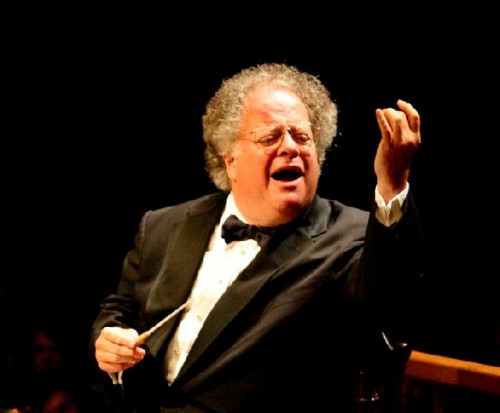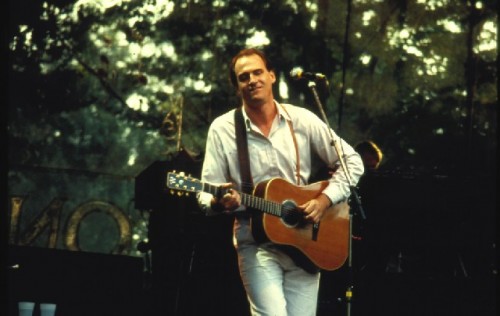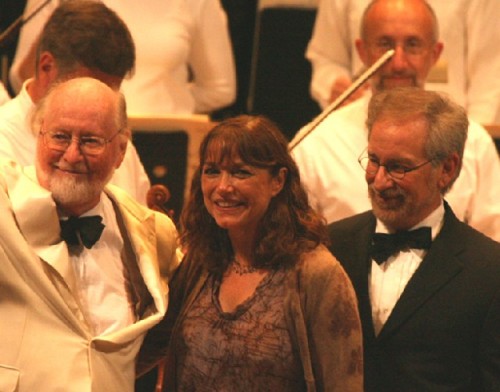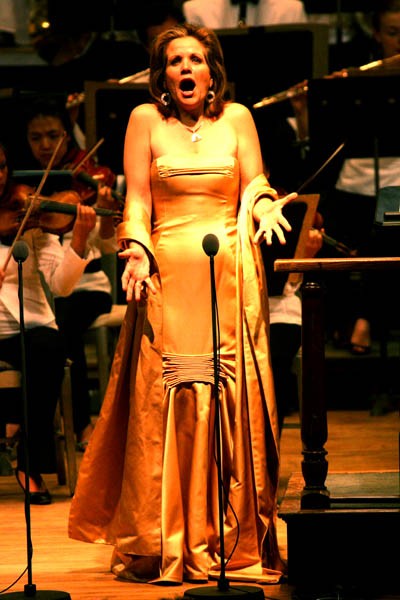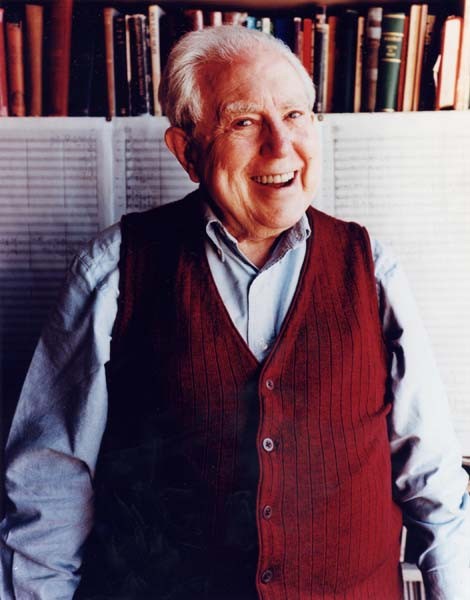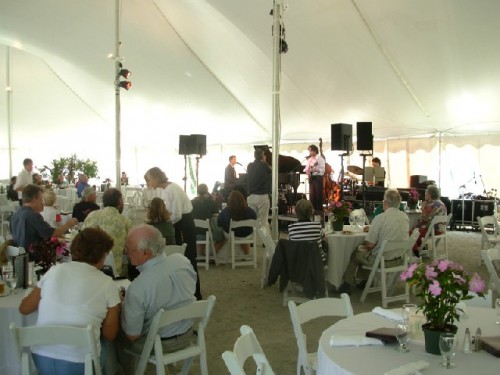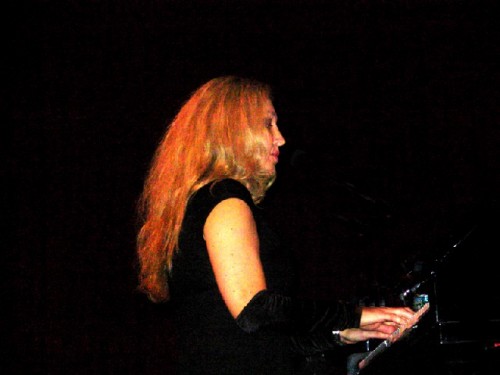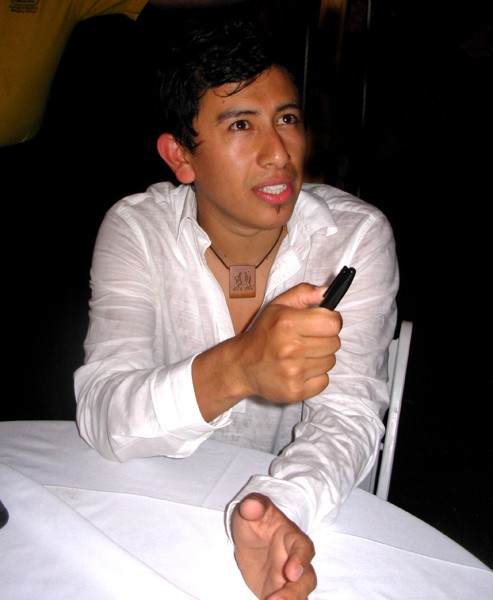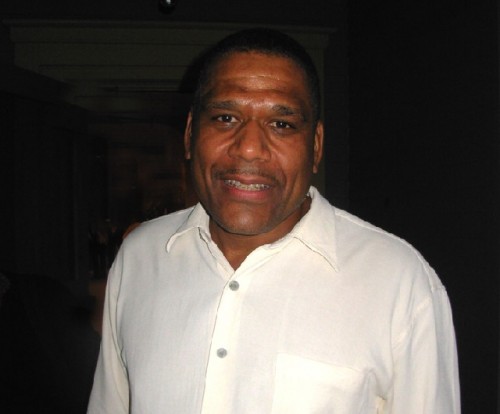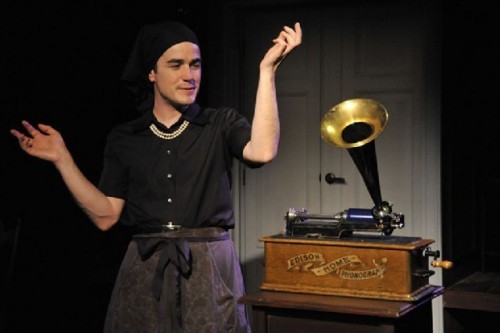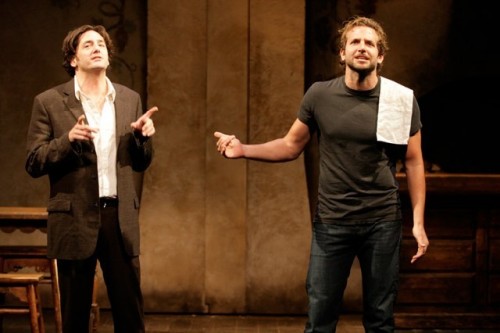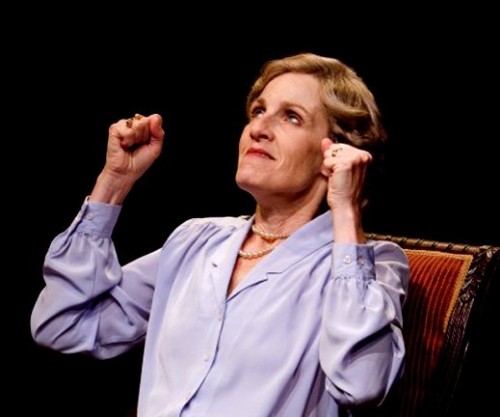The Berkshire Arts Season Summer 2008
Recalling Tanglewood and Theatre
By: Astrid Hiemer - Sep 17, 2008
Sitting under the stars in a comfortable lawn chair, covered by warm clothing or a blanket, and listening to music at Tanglewood – is heavenly. We were invited by friends or we collected a group of picnic-and-music-afficionados ourselves and made the trek several times, armed with a season pass. The days or evenings for lawn and music visitors were rare this summer, because all North Eastern States were showered with rain and storms, thunder and lightning. (Instead, we did not have to water lawn, plants, and our vegetable garden much of the summer, which, of course, presented other problems for gardeners and farmers alike.)
We experienced the spectacular Opening Night of the Boston Symphony Orchestra (BSO) under the direction of James Levine and with the Tanglewood Festival Chorus, conductor John Oliver. Berlioz opera in five acts, "Les Troyens" was presented Saturday evening (Part I: The Capture of Troy) and on Sunday afternoon, the remainder of the opera (Part II: The Trojans at Carthage). All the critics heralded the performances. It was magnificent and unfortunate; James Levine underwent an emergency operation within a couple of days, and recuperation would take the entire season. He is scheduled to return to the BSO for the Fall Season.
James Taylor packed the shed and the lawn with two performances in early July. As we looked around, there was virtually no space left to sit or stand anywhere, that lucky and sunny Sunday, when we attended. Rumor has it, that 15,000 lawn tickets were sold for each performance. Who can argue with such financial success. Taylor, who lives in the Berkshires, sang seasoned and new tunes and showcased excellent musicians from around the world. Tanglewood celebrated his 50th birthday and surprised him and the audience with his well known friends, including John Travolta.
We came with our children and grand-children, who were visiting from Washington, D.C., one Sunday afternoon in August for "Rhapsodie Espagnole," by Ravel, Bruch's "Violin Concerty No.1," and Rimsky-Korsakov's "Scheherazade." We wanted to introduce the kids to the 'Tanglewood Experience,' and we will return with them from now on. Of course, for a three and four year old, seeing the stage and the musicians in white, as Nola remarked, was interesting, but otherwise, roaming the grounds and playing with new friends, made their day.
Lisa and Robert urged us to join them on August 23, for an all Beethoven program: "Symphony No. 2 in D, Opus 36" and "Symphony No.3 in E-flat, Opus 55," better known as the "Eroica Symphony." Christoph von Dohnanyi was the guest conductor, whose work and name I knew from his Hamburg, Germany, opera house appointment. It was the last Saturday concert and happily we drove one more time to Tanglewood, feeling a twinge of regret that the season was coming to an end. Lisa and Robert went to their places in the shed after intermission, but assured us that it was more enjoyable to listen to the music with friends, from the lawn, and to see the program on the large screen.
But we were also part of the Koussevitzky Shed-crowd a few times: On August 2nd, we experienced the Tchaikovsky opera "Eugene Onegin," which was sung in Russian with English supertitles. Renee Fleming's voice is just magnificent and seven other beautiful solo voices shared the stage with her and the Tanglewood Festival Chorus. Every time the Chorus is part of a program, the sheer force and beauty of those voices add wonderfully to the event. Listening to the original Russian text gave it an authentic tone.
A lighter evening, with John Williams' Star Wars and many other film music pieces, conducting the Boston Pops, was definitely a highlight. The big surprise, Steven Spielberg, narrated movie clips and it actually became for us a learning experience. We watched and listened to how film-music is composed and then performed. The audience saw a film clip with and without sound. That was interesting. "Tanglewood on Parade," an evening with five conductors and two orchestras, the BSO and the Boston Pops, heightened the spirits and lit the sky with fireworks.
Most informative, enjoyable, and mind-opening, were the Elliot Carter music performances at the occasion of his 100th birth year. Mr. Carter attended both evenings when we were also at Ozawa HalI. The program included chamber works and German romantic poetry as 'Lieder', performed by singers with fine and expressive voices and musicians, who were Tanglewood Fellows. On the second evening Carter's "Concerto for Orchestra" was scheduled. Nature performed with the musicians on cue. A thunderstorm underscored the musical event all evening. I regret that we could not participate in more presentations, which were scheduled for an entire week. James Levine and staff had invested much energy, time, and resources into this project and it would have been mind-filling.
Early in the season we came to an event by the Mark Morris Dance Group, with the Tanglewood Music Center's Vocal Fellows and Pianists. It was presented on the stage of Ozawa Hall. I was mostly touched by the abstract interpretations of some Schubert and Brahms Lieder and still know the text of "Erlkoenig" by heart. It is a Goethe poem, which all young students of my generation in German schools had learned and recite.
The Tanglewood Jazz Festival, only in its third season, almost sold out during the Labor Day weekend. And two sunny and warm days drew a large crowd to the Ozawa Hall lawn. The many excellent performers included the: Edmar Castenada Trio. Castenada, a virtuoso Colombian harp player, seemed to become one with his instrument. Last year we arrived at the Jazz Café tent just after he had ended his session and people around us were raving about the music. This year we were there and the Castenada trio played on the main stage.
Eliane Elias presented a tribute to Bill Evans: "Something for you." Her husband, Marc Johnson, the double bass player in her group, had received a tape from Bill Evans shortly before Evans died. The tape with new music in progress became a CD and a program some twenty years later, when the tunes were rediscovered. Elias, a pianist, and originally a Bossa Nova singer, sounded most mellow and authentic, when singing from her Brazilian heart.
There was a live taping for "Piano Jazz" on NPR and Marian McPartland's 90th Birthday Celebration. The special guests were: Singer Nnenna Freelon, a magnificent song interpreter and singer/song writer and Spencer Day, who is young, and will have an interesting career. She had also invited Mulgrew Miller, known as one of the most recorded pianists, having participated in more than 400 recordings.
Donal Fox, a pianist and composer, introduced the "Scarlatti Jazz Suite Project" and showcased the young trumpeter Christian Scott. And, Eddie Daniels, a fantastic saxophone and clarinet player and his quartet performed old and original jazz tunes.
Sunday evening, the last Tanglewood performance of the 2008 season was reserved for Terence Blanchard's "A Tale of God's Will (A Requiem for Katrina)." The presentation, now exactly three years after the hurricane, happened on the eve of another ferocious storm threatening the Gulf Coast "Gustav." The thirteen parts of the requiem were composed by Blanchard and his band members: Aaron Parks, Kendrick Scott, Brice Winston, and Derrick Hodge. Blanchard, who had composed most pieces, and the band all felt the need to respond musically to the Katrina tragedy. The Tanglewood Jazz Orchestra with 34 musicians added beautifully to the volume of the sound. Needless to say, that we experienced an emotional evening. The music evoked sorrow, anger, despair, hope, love, envy, calm and chaos. It was a historical event and Ozawa Hall should have been filled to the last seat with visitors.
Williamstown Theatre Festival
During the Season, June to August, we attended every Thursday evening the opening performance of a play at the Williamstown Theatre Festival (WTF). Nicholas Martin, this year's new director, smartly imported the first two plays from the Huntington Theatre in Boston, where he had been the artistic director for several years. They were "She Loves Me," actually a musical, and "Beyond Therapy" and very successful. In fact the 2008 season was better attended than prior years, and so the audience gave a high approval rating to this summer's schedule.
My most memorable plays at the small stage, the Nikos Stage, were "Broke-ology," a new play by the young playwright Nathan Louis Jackson. It was chosen at the last minute, because another play was withdrawn. What a great 'broke' – eh 'brake,' for a young playwright. The theme presented in an African American family of longing to move beyond community barriers and responsibilities within the family. It is nevertheless a universal subject. All actors were excellent and the evening turned into a moving experience. (With Francois Battiste, Gaius Charles, Wendell Pierce, and April Yvette Thompson).
In "The Understudy," by Theresa Rebeck, we were mesmerized by the main character, the understudy, Harry (Reg Rogers). It is a complex plot, where even Franz Kafka plays a role - so to speak. See it to understand it, or read my article of 7-25-08 on BFA about this play.
On the main stage at WTF, "A Flea in Her Ear," was billed as a new version of Georges Feydeau's farce by David Ives. It was a memorable and very funny production, and I heartily enjoyed the farce. I must admit, that I mostly prefer serious plays or maybe a wonderful comedy, but seldom a farce. But the large cast, slamming doors or running in and out of sight at high speed, and a wonderful and silly plot gave us a hilarious evening.
Anton Checkhov's "Three Sisters" is a dated and also a timely play. The American presidential election of 2008 is looming large. It is a tale of inaction within a family, members of the privileged, landowners. The year is just shortly before the Russian revolution. Times are changing and instead of acting and preserving their land and home, the family looses their identity and wealth. "Three Sisters" was a timely reminder for America.
Barrington Stage Company, Pittsfield
Julianne Boyd and her staff are working hard to extend the Summer Season and are presenting plays and musical events in late Spring and into the Fall.
We saw "I Am My Own Wife" in May and BFA has published three articles about the play. My own centered on the generic use of 'accents' in theatre, which was particular to this play. And, I wrote about languages and accents in general. The one man, sorry, one woman play was superbly acted by Vince Gatton, and worth seeing, when possible.
"The Spelling Bee" originated at Barrington Stage a few years ago and had a successful run on Broadway. It returned this season to Barrington Stage. Apparently, this musical put the now Pittsfield Company in the theatre world spotlight nationwide. It is a fine little musical and the young actors were wonderfully enthusiastic with good voices. It was theatre for all ages.
We also saw the productions of "The Violet Hour," by Richard Greenberg and "Private Lives," by Noel Coward. And they were two very enjoyable evenings.
Shakespeare & Company, Lenox
Tina Packer, Artistic Director, and her company opened a new theatre this year, the Elayne P. Bernstein Theatre. We have not seen a performance from the new stage. But the "Othello, " played by John Douglas Thompson, is seared in my mind. His interpretation of Othello's role in the Shakespeare tragedy was powerful. And Desdemona, sweet Desdemona, was beautifully and innocently played by Merritt Janson. It was a 'tragic' evening.
Berkshire Theatre Festival, Stockbridge
We saw two plays at the small and intimate Unicorn theatre with only 112 seats. And for me this theatre company, actually with two theatres, presented a great 'find' this summer. Seat prices range from $ 20 to $40 and are quite affordable.
So "Waiting For Godot," by Samuel Beckett, presented a widely anticipated moment, a new and contemporary interpretation of the sixty year old play. It was rumored that Gogo (Stephen DeRosa) was searching out and flirting with women in the audience. Was he really looking at me repeatedly? No, actors cannot see far into the audience, into the darkness from a well lit stage. But the nonsensical and rhythmic monologue of Lucky (Randy Harrison) was riveting. How can an actor, without 'Souffleuse' (a prompter) as in European theatres, remember lines that make no sense and last for ten minutes? He appeared to be an addict and under the total control of his master, Pozzo (David Schramm). Pozzo filled the small and intentionally distorted stage fully with his large body, and he was menacing. All four actors left us with remarkable memories.
I understand the one woman play by Rhoda Lerman, "Eleanor: Her Secret Journey," primarily as an anti-war play. Elizabeth Norment presented a convincing Eleanor to the audience. I am a war-time baby and grew up in post war Germany. So I bring to any experience in my life, my life story, as any other American does. And it is different from many Americans, who have yet to experience the horrors of war. No matter how much we see and read in the media, or hear our politicians, I am always struck by the many American responses, so different from mine.
So, I interpret the Eleanor Roosevelt play, which begins with a telephone call by then President Truman, informed by my own life story. In the beginning she rejects the idea of becoming a United States Delegate to the United Nations. She reflects on her life with Franklin D. Roosevelt throughout the play: The horrors, she saw, when visiting the battlefields of WWI in France. She remembers the British Major, who tried to convey to her the atrocities of war with a soldier's voice. Then came WWII and her own travels to the American front. She also reflects on life in between these two major wars, which shaped our current world.
Other writers have made much of what is in this play and what is left out, all minor points. At the end of the play, Eleanor Roosevelt accepted President Truman's request. She worked hard for peace as the President and Chair of the United Nations Commission on Human Rights from 1946 to 1952.
We were fortunate to hear and see many music and theatre projects in the Berkshires this summer. I did not report here on exhibitions and other cultural events, which also add to the myriad of choices. But many of my reflections on this cultural Berkshire season can be read in more detail and by several writers for Berkshire Fine Arts. Please do so!

